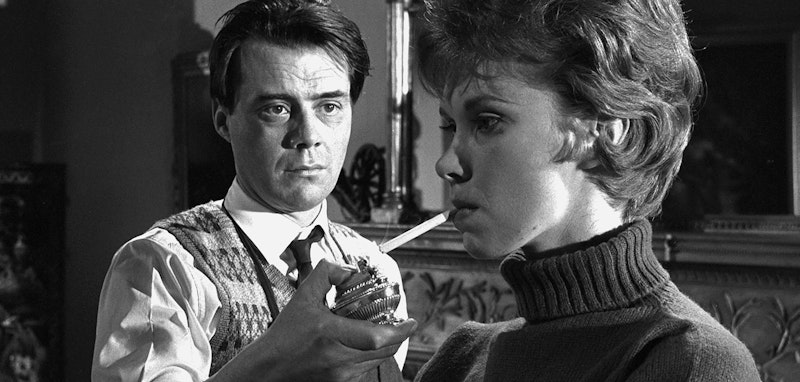The Servant is a 1963 British film about a sinister valet who insidiously takes over the life of his arrogant but lazy upper-class employer. Having received new attention since a restored version was released in 2013, the film’s noted for its encapsulation of the British class system in decay; for its undertones of homoeroticism when such remained taboo; and for its creepiness. Renting this arthouse classic on Amazon TV, I found it oddly evocative of the Trump era, with elements of the President reflected in both of the lead characters.
The film was directed by Joseph Losey, an American who’d fled the Hollywood blacklist; the screenplay, by Harold Pinter, then just starting to get fame as a playwright, was based on a novella by Robin Maugham. Dirk Bogarde’s performance as Barrett, the manservant, is chillingly vivid, with subtle expressions providing hints of character and plot. His victim, Tony, was played by James Fox in his first major role. Douglas Slocombe’s cinematography emphasized moody atmospherics, with shadows, mirrors and odd angles producing a sense of menace and claustrophobia in the London townhouse where the action mostly takes place.
The story opens with Barrett arriving at the townhouse to be interviewed by Tony, whom he finds asleep after too many lunchtime beers. Tony wants a “gentleman’s gentleman” in the newly purchased house, rather than a nagging old-lady housekeeper. Barrett begins the job with expected deference, proving useful in cooking meals, choosing wine and advising on décor. Yet Tony’s fiancée Susan (Wendy Craig) takes a dislike to Barrett, who seems to be coming between the couple as when he interrupts a romantic evening. She puts Barrett in his place with imperious orders but can’t get Tony to fire the servant or limit his presence.
Tony’s mostly a man of leisure, living off inherited wealth. He talks about a project to develop real estate on a large scale in Brazil, but his vagueness suggests this is a scheme or scam with distant partners interested primarily in his money or aristocratic name. He drinks a lot and maintains a casual air of superiority, routinely issuing brisk commands or peevish complaints.
Barrett soon gets Tony’s assent to bring in a maid, Vera (Sarah Miles), whom he says is his sister. Vera’s wide-eyed glances and knee-grazing skirts get Tony’s attention. Soon, Barrett and Vera leave for a supposed visit to their ailing mother in Manchester, but Vera returns that night claiming she’d felt ill at the train station. Alone in the townhouse, Tony and Vera begin an affair.
Susan gets Tony to visit her parents at their estate outside London. But when they come back earlier than expected, they find Barrett in bed with Vera in the master bedroom. Stunned, Tony demands an explanation, yelling: “She’s your sister, you bastard!” Barrett insouciantly replies that Vera’s not his sister, and they’re engaged. From Tony’s crestfallen reaction, Susan can tell his interest in this matter is more than that of a concerned employer. Tony kicks the two servants out of the house; Susan walks out as well, seemingly ending their relationship.
Tony spirals downward, his alcoholism worsening. Sitting at a restaurant bar for a midday whiskey, he runs into Barrett, who mournfully begs for another chance, saying that Vera had run a con job on both of them and taken Barrett’s money. Tony takes Barrett back, and their relationship soon loses its hierarchical character; they’re more like housemates, drinking buddies, and possibly something more, though whatever that might be remains offstage.
Things decline fast. Tony realizes he’s been drinking too much, but Barrett encourages him to sip something that’s mysteriously potent. Vera comes by, and Barrett, after a supposed objection, lets her in. Susan arrives, worried about the man she still loves. Several guests show up, apparently ready for a debauched party. Barrett orders Susan and the guests to leave, as Tony stumbles around in a stupor laced with anger and despair. Finally, as Barrett meets Vera in the master bedroom, a bleary-eyed Tony languishes in the hallway, seemingly aware of how far he’s fallen yet unable to do anything about it.
Watching this squalid story unfold, I imagined Donald Trump’s face staring back at me from the townhouse’s many mirrors. The cleverness in exploiting weakness; the endless supply of lies; the resentment at being looked down on; the delight in causing chaos; the quest to dominate and demean—these are qualities of fictional manservant and corrupt president alike. Yet the dissolute employer cuts a Trumpian figure as well: breezily confident and entitled; reckless in pursuit of gratification; lacking in empathy, curiosity, competence and integrity.
An unanswered question in the story is to what extent Barrett has planned things out. It’s evident that he’s up to no good from early on, but he often seems to be responding in an ad hoc way to unexpected circumstances; he didn’t know Tony and Susan would return early from their trip, and his later reunion with Tony seems to have arisen from a chance encounter. Barrett may be improvising his deceptions, seeing what he can get away with rather than following a long-term strategy. His impulsive, lurching approach also has a contemporary echo.
Notably, as Barrett gains power, he shows little interest in attaining an associated dignity. Rather, he becomes increasingly uncouth and disheveled, overseeing a scene of vulgarity. Bringing others down is more important to him than raising himself up, and while he may set a “new tone” on occasion, it doesn’t last long. All this is grimly familiar in the troubled America of 2020. The Servant is a case study in human degradation, and so is the Trump White House.
—Kenneth Silber is author of In DeWitt’s Footsteps: Seeing History on the Erie Canal and is on Twitter: @kennethsilber

